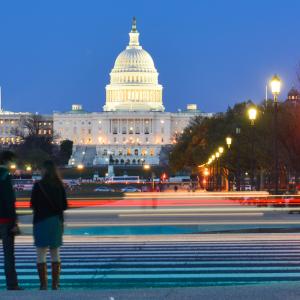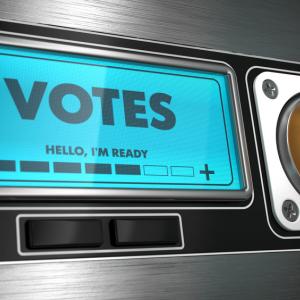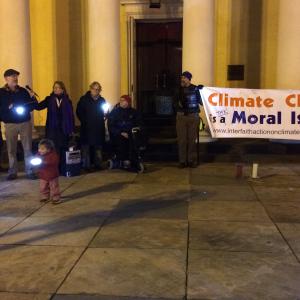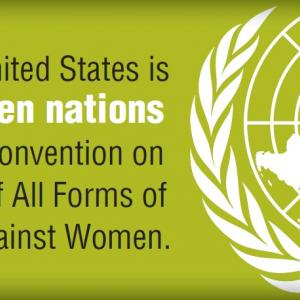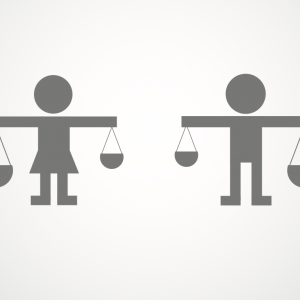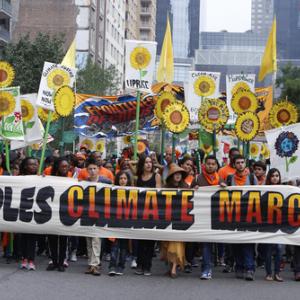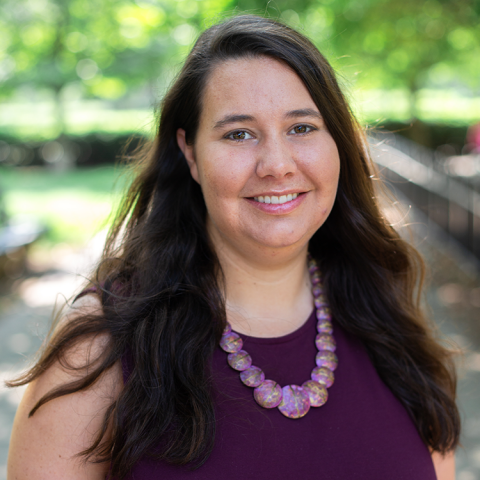
Rev. Kaeley McEvoy is the the fellowship program director and staff chaplain at Sojourners. Formerly she served as associate pastor at Westmoreland Congregational UCC in Bethesda, Md.
A former Sojourners fellow herself, McEvoy is ordained in the United Church of Christ and received her master of divinity degree from Union Theological Seminary in New York City with a focus in interreligious engagement and eco-feminist theology. Her thesis project focused on uplifting the legacy of the Clergy Consultation Service on Abortion and the legacy of protecting reproductive rights in religious spaces. During her time in New York City, she also served at Judson Memorial Church, the Riverside Church, and worked in the New York City Mayor’s office as a community affairs liaison. Her areas of specialty include reproductive justice and eco-spirituality. She received her undergraduate degree at Gettysburg College in Gettysburg, Pa., where she majored in religious studies, writing, and peace and justice studies.
In her spare time, Kaeley enjoys writing poetry, gardening, and playing pick-up soccer. Her personal work and writing has appeared in Sojourners, Red Letter Christians, andThe Washington Post.Kaeley is also committed to the lifelong struggle of anti-racism and serves as a leader in the D.C. chapter of S.U.R.J (Standing Up for Racial Justice) as well as the national SURJ-Faith organizing team.
Raised in Connecticut, Kaeley calls the Mt. Pleasant community of Washington, D.C., home and usually remembers to flip her backyard compost bin. You can find her on Twitter (X) at: @KaeleyMcEvoy
Speaking Topics
- Mutual Aid and Community Creation
- Eco-Theology and Environmental Justice
- Reproductive Health and Justice
- The White Work of Anti-Racism
- Abolition as a Faith-Based Practice
- Joy as a Method of Resistance
Speaking Format
- Workshops
- Keynotes
- Sermons
- Co-create Personalized Rituals
Languages
- English
Past Notable Events
- “Miriam and the Easter Vigil,” Luther Place Memorial Church, Washington, D.C., Spring 2025
- “Yes, We Really Do Mean Abolition,” Cleveland Park United Church of Christ, Washington, D.C., Fall of 2024
- “Let the Tambourines Sing,” Riverside Baptist Church, Washington, D.C., Summer of 2024
- “Disaster Politics,” First Congregational Church, Washington, D.C., Summer of 2024
Posts By This Author
The 3 Bad Bills of March: Congressional Immigration Update
Over the past two weeks, Congress has considered multiple pieces of anti-immigrant legislation. Much of this legislation, introduced by Republicans, continues to promote rhetoric that criminalizes hard-working individuals living within the United States without documentation, endangers children who were born in America, and seeks to further punish children who are in search of refuge as they escape many forms of terror in Central America.
Although the legislative status varies for each piece, it is imperative for the public to be aware of the immigration reform policies being considered and how they impact our communities.
Brief overviews of three important anti-immigrant legislative pieces are summarized at the jump.
Ruling on 26-State Immigration Lawsuit: 3 Things You Need to Know
On Monday night, a Texas court temporarily halted the implementation of Obama’s Executive Action announced last November. Specifically, the ruling delays the application of the extended Deferred Action for Child Arrivals (DACA) — previously slated to begin on Feb. 18 — and Deferred Action for Parental Accountability (DAPA) programs until the ruling is superseded by a higher court.
This ploy began in December, when a combination of governors and attorney generals from 26 Republican-run states sued the federal government to block the Department of Homeland Security directives from going in to effect. This lawsuit, Texas v. United States of America, challenges the legality of both the DACA and DAPA initiatives, which together would have granted nearly 5 million immigrants eligibility for temporary deferred action and work permits.
Here’s what you need to know about the Texas vs. United States ruling in the aftermath of Monday night’s decision.
Homeland Security Funding the Latest GOP Bargaining Chip in Immigration Debate
In November, President Obama issued an executive action that would protect nearly five million undocumented immigrants in the United States. Yet, since Congress returned in January, many questions linger regarding the implementation of executive action and the status of comprehensive immigration reform.
Last week, the Senate Committee on Homeland Security and Governmental Affairs hosted a hearing regarding “Deferred Action on Immigration: Implications and Unanswered Questions.” The purpose of the hearing according to Chairman Sen. Ron Johnson (R-Wis.) was to “obtain a more complete understanding of the logistical, financial, and national security implications of these [executive action] policies.” Yet, many questions still remain.
Among other things, Obama’s November action expanded the 2012 Deferred Action for Childhood Arrivals program and provided legal reprieve to the undocumented parents of U.S. citizens and permanent residents who have resided in the country for at least five years. It protects a small number of the 11 million aspiring Americans who are living and working in the United States without documentation. At it is root, Obama’s executive action considers the people, not the politics that create division.
The GOP majority in Congress is attempting to oppose executive action by threatening to defund the Department of Homeland Security.
Five Reasons Why Citizens United Matters Five Years Later
Five years ago, the Supreme Court ruled in Citizens United v. Federal Election Commission that corporations are welcome to the same free speech rights that are allotted to individuals and can therefore spend freely on direct political advocacy.
To those unfamiliar with the topic, Citizens United essentially opened the flood gates for dark money to flow into the Washington electoral circuit. Within the five years since this decision the amount of money spent on political campaigns has steadily increased each election cycle. The most recent midterm elections cost $3.7 billion dollars.
Why should this matter to Christians?
1. Divine dignity is silenced.
The Center for Responsive Politics reported that only “666,773 individuals donated more than $200 to campaigns in the 2014 election cycle." What does this mean? Only 0.2 percent of the population funded the elections. Only the wealthiest Americans, through Super PAC funding and private corporation contributions have influence over the electoral state. The voice of the average American is almost completely silenced because they do not have financial influence. This becomes an issue of morality when we see each citizen as an individual with divine dignity. When the voice of the individual is silenced, the voice of the Divine is also silenced because only the economically elite are heard.
Australia’s #IllRideWithYou — An Advent Expression of Emmanuel
“If you don’t feel safe alone, I will ride with you.”
These words have so much depth.
When an armed man with unidentified ties to radical Islam took control of a Sydney café for over 16 hours on Monday, a social media campaign under the hashtag #IllRideWithYou started rapidly trending on Twitter. Australians started the hashtag to stand in solidarity with Muslims during the immediate tension following the siege. In a matter of hours, the hashtag became an international movement creating over 480,000 tweets.
The hashtag was inspired when one user tweeted the story of a young Muslim woman who removed her hijab (traditional Islamic head scarf) while riding public transportation because she feared that identifying herself as a Muslim would put her in danger of misdirected violence toward innocent Muslim citizens in the aftermath of another extremist fueled act. The tweet continued to describe another young woman who “ran after her at the train station [and said] ‘put it back on. I’ll walk with u [sic]..’”
This original tweet inspired Tessa Kum, an Australian TV content editor, to reply with a message that sparked a movement. From her handle @sirtessa, Kum tweeted,
“If you reg take #373 bus b/w Cogee/Martin Pl, wear religious attire, & don't feel safe alone: I'll ride with you. @ me for schedule.”
Five Gifts for Your Favorite Faithful Feminist
With Christmas less than a week away, the time for last-minute gift shopping is now. Sojourners’ Just Giving Guide has detailed a variety of ways to shop in a socially-conscious manner. We’ve gone one step further and highlighted some unique purchases from organizations that directly impact the lives of women and girls internationally and domestically. Check out the links below for creative gifts that make a difference for female empowerment.
Who Cares About The Cheerleaders?
The Buffalo Bills cheerleaders are advised by management on which type of feminine product they should use for their menstrual cycle. They are told that they cannot wear clips or tie backs in their hair. They have been asked to perform backflips on demand at an annual golf tournament where men placed bets on which Buffalo “Jill” would ride in his golf cart.
For all these imposed regulations and for hundreds of hours of work, members of the NFL Buffalo “Jills” Cheerleading Squad did not receive a penny of wages.
In April, five former Jills cheerleaders filed a lawsuit in the New York Supreme Court against the NFL franchise for "exploiting the women by failing to pay them in accordance with New York State minimum wage laws."
The worst part of this is: I don’t care.
When I was growing up I never wanted to be a cheerleader. I barely had a Barbie doll. I raced my brother’s Big Wheel on foot. I never had the desire to stand on the sidelines and cheer for other people, namely men, that were considered more athletic than myself.
So when I heard the news of the Jills’ unfair treatment, my personal sympathy level was somewhat low. They wanted to be cheerleaders, right? They signed up to wear short skirts and tight tops and dance in front of millions of people — they didn’t have to do that.
One commentator on the Jills’ lawsuit said, “Nobody forced them to be cheerleaders. They weren't enslaved. Stop with the pity party.”
And there lies the rub. What’s really at the root of these issues?
Keep the #LightForLima Alive: Interfaith Groups Hold Vigils for Lima Climate Negotiations
Sunday night, people of all faiths gathered across the world for interfaith prayer vigils for the U.N. Framework Convention on Climate Change (UNFCCC) in Lima. In 13 countries, participants in #LightForLima prayer gatherings joined together in solidarity for collective song and prayer in hope that the negotiators at the UNFCCC will make decisions that will preserve the state of the earth for future generations.
Organized by the international multi-faith organization OurVoices, groups in Sydney, Ottawa, New York, London, and Washington, D.C., and elsewhere joined together to light up solar lamps and candles to share hope for successful negotiations in Lima. Desmond Tutu provided groups with this powerful prayer which was read at vigils across the globe last night:
Holy God, earth and air and water are your creation, and the web of life is yours.
Have mercy on us in the face of climate chaos.
Help us to be keepers of your Earth:
to simplify our lives,
to reduce our use of energy,
to share the resources you have given us,
to raise our voices for justice
and to bear the cost of change.
We kindle this “light for Lima” as we pray for the climate change negotiations in Lima, Peru.
Leaders Across all Faiths Gather for Joint Declaration Against Modern Slavery
“There is neither Jew nor Greek, there is neither slave nor free, there is no male and female, for you are all one in Christ Jesus.” Galatians 3:28
Thirty-five million people are trapped in a form of modern slavery.
35 million. Let that sink in.
Last week, the campaign to end human trafficking took a large step forward. Religious leaders from the Christian Catholic, Anglican, and Orthodox traditions joined with Hindu, Buddhist, Jewish, and Muslim leaders to jointly declare their intention to end modern-day slavery. The Joint Declaration of Religious Leaders Against Modern Slavery reads:
We pledge ourselves here today to do all in our power, within our faith communities and beyond, to work together for the freedom of all those who are enslaved and trafficked so that their future may be restored. Today we have the opportunity, awareness, wisdom, innovation and technology to achieve this human and moral imperative.
The moral imperative to end human slavery transcends every religious doctrine.
Christian Scripture affirms that “there is neither slave nor free, for you are all one in Christ.” The Qu’ran confirms the divine dignity of each human stating, “God has given dignity to the all children of Adam” (The Noble Qur’an, 17:70). The command to “protect the stranger in our midst” (Exodus 22:21) appears 36 times in the Torah — which according to the Talmud is more often than the laws of the Sabbath or of keeping kosher. Hindu leader, Her Holiness Mata Amritanandamayi called human enslavement, “an open wound on the body of modern society.”
Each major religious tradition acknowledges the inherent God-given dignity of each being. An excerpt from the declaration affirms that:
In the eyes of God, each human being is a free person, whether girl, boy, woman or man, and is destined to exist for the good of all in equality and fraternity. Modern slavery, in terms of human trafficking, forced labour and prostitution, organ trafficking, and any relationship that fails to respect the fundamental conviction that all people are equal and have the same freedom and dignity, is a crime against humanity.
An international faith declaration will not change the complex causes, intricate networks and international power structures that run deeply through the roots of modern slavery.
Yet, it is a start.
A Flicker of Hope in Lima: The Commencement of U.N. Climate Summit Meetings
Within the past three months tremendous strides have been made toward protecting our earth. The People’s Climate March drew hundreds of thousands of people to the streets of New York City to advocate for climate action. The Keystone XL pipeline failed to pass the U.S. Senate. The United States and China passed a joint agreement to limit their greenhouse gas emissions.
This week there is great hope that progress will continue.
The Lima conference is seen as the last-stop in a series of slow moving international conversations leading up to the 2015 UNFCCC conference, which will happen next December in Paris. The ultimate goal of this climate-focused body of the United Nations, which has met for nearly two decades, is to have the nations of the world sign a landmark climate change agreement that drastically reduces greenhouse gas emissions country-by-country.
With Paris a year away, Lima is being called a hopeful stepping stone in this process.
Report: Solutions to Hunger, Poverty Must Focus on Empowering Women
Globally, women and girls are disproportionally affected by hunger and poverty. In reference to completing the United Nation’s Millennium Development Goals (MDGs), Bread for the World reported, “We will not end hunger and poverty by 2030 without ending the discrimination that women and girls face day in and day out.”
This morning, Bread for the World, released the 2015 Hunger Report, When Women Flourish, We Can End Hunger. The comprehensive analysis focuses on the imperative role the empowerment of women and girls plays in ending hunger, extreme poverty, and malnutrition.
Asma Lateef, director of Bread for the World Institute, said:
“Eliminating barriers and empowering women around the world is key to ending hunger in our time. We must not tolerate discrimination against women and instead, [we must] demand a comprehensive approach to women’s empowerment that includes applying a gender lens to all programs and policies.”
If there is hope of eliminating poverty, as an international community, we must look holistically at the cultural, economic, social, and religious aspects of the systems that perpetuate poverty. The 2015 Hunger report effectively examines the role of gender in poverty alleviation and prescribes tangible recommendations for international and domestic reform for the common good.
Click here for the full report along with infographics, personal narratives, and a scriptural study guide.
U.S., China Strike Agreement Limiting Greenhouse Gases
This morning, President Barack Obama and President Xi Jinping of China made a historic announcement that their countries would limit greenhouse gas emissions.
The United States and China are the world’s two largest consumers of energy and two largest emitters of greenhouse gases. Together, they account for 40 percent of the world’s emissions.
This announcement is a milestone for two reasons. First, this is the first time that China, the world’s No. 1 producer of greenhouse gas pollution, has made any pledge to limit its rapidly growing emissions. Second, this is a major breakthrough in U.S.-China relations that highlights what’s possible when the two superpowers work together on an issue.
Both leaders hope that this statement will inject momentum into global climate negotiations by putting pressure on other major countries to reflect on their own plans for major emissions reductions.
A written statement alone will not alter the course of climate action internationally. However, this announcement has laid a foundation for an international collaborative relationship on climate change. As President Xi told President Obama on Tuesday evening, “A pool begins with many drops of water.” For the sake of God’s creation let’s hope that the drops of climate change collaboration continue to gather.
For more on this story The Hill’s report.
Voters, Not NRA Lobbyists, Win in Washington State
There is much reason to be distressed about the current scope of the American political sphere. After Tuesday’s midterm elections, constituents on both sides of the aisle voiced legitimate concerns about the direction of our country. Yet, on Wednesday morning there was a glimmer of great hope for the American people.
In Washington state, ballot measure I-594 introduced stricter background checks into state gun protocol. Why is this an important moment of triumph for the American people?
On I-594 the people won. Not the lobbies. Not the politicians. The people.
Washington voters made history by becoming the first state to expand background checks to all gun sales by popular vote. By strategically moving the fight for commonsense gun policies from gun lobby-dominated legislatures to the ballot box, democracy in Washington state was able to function on a person-by-person basis.
Listening with Radical Ears: The Importance of the 2014 IPCC Climate Report
“The reason I speak to them in parables is that ‘seeing they do not perceive, and hearing they do not listen, nor do they understand.’ With them indeed is fulfilled the prophecy of Isaiah that says: ‘You will indeed listen, but never understand, and you will indeed look, but never perceive. For this people’s heart has grown dull, and their ears are hard of hearing, and they have shut their eyes” (Matthew 13:11-15)
Humans shut their eyes to truth.
This week, the Intergovernmental Panel on Climate Change released the final installment of its three-part synthesis report on climate change. According to Rajendra Pachauri, the chairperson of the IPCC, this report is the “strongest, most robust, and most comprehensive analysis” to come out of the IPCC, which has been tracking climate change since 1988. Yet, there are still some who are hard of hearing.
The data that lies within the report is nothing completely new: climate change is happening, humans are responsible for climate change, and fossil fuels are severely damaging our levels of CO2. So, what is different about the newest installment of the IPCC report?
The emergence of one word: irreversible.
Protecting God’s Children: How Gun Violence Impacts America’s Youth
Michael Brown. Sandy Hook. Trayvon Martin. Aurora. Columbine.
Within the last decade, the narrative of children and teenagers being killed by gun violence has become an all-too-familiar narrative in the American public sphere. In a recent report compiled by The Brady Campaign, statistics revealed that in 2011 alone, 19,403 children were shot and 2,703 children and teenagers lost their lives to guns.
That’s seven of America’s youth under the age of 20 killed every day.
In the book of Matthew, the disciples ask Jesus, “Who is the greatest in the kingdom of heaven?”
Jesus calls a child to join the group.
“Truly I tell you, unless you change and become like children, you will never enter the kingdom of heaven,” he answers.
If as Christians, children represent God’s creation in its most pure and innocent form, why is it that as Americans, we continue to let children die preventable deaths from gun violence? Gun control policies are a difficult discourse for the American public. Yet one thing we can all agree on is that children should not be killed.
Of the 2,703 children killed in 2011, 61 percent were homicides, 32 percent were suicides and 5 percent were unintentional shooting. These statistics propel gun-related deaths to the number two leading cause of death for youth in America.
Hearing Tamar: The Role of Guns in Domestic Violence
It is frightening to consider that within the context of violence against women, little has progressed since the time of the Old Testament. Currently, 1-in-3 U.S. women will experience intimate partner violence throughout her lifetime. Even more frightening is that every month, 46 women are killed by an intimate partner with a gun.
Americans across partisan, personal, and religious lines are divided on the role of the Second Amendment in the public square. Yet no matter ones’ stance on gun control procedures, one fact transcends opinion: women are at a higher risk for intimate partner gun violence than men.
From 2001 through 2012, 6,410 women were murdered in the United States by an intimate partner using a gun — more than the total number of U.S. troops killed in action during the entirety of the Iraq and Afghanistan wars combined. The rate at which domestic violence turns to murder is a harsh reality — and when a domestic abuser has a gun, a victim is 12 times more likely to die than when the abuser doesn’t.
Worshiping a Golden Calf: The Moral Reason to Get Money Out of Politics
To avoid conflict, it is suggested that friendly conversation omits three things: money, politics, and religion. However, it’s no secret that in current Washington discourse two of these things seem to be indefinitely intertwined. I’ll give you a hint — it’s not “money and religion.”
In the past decade, the intimate relationship between money and politics has infiltrated the public sphere at an alarming rate: corporations set public policy agenda items, super PACS have unlimited reign over campaign finance, and just 0.4 percent of the U.S. population is responsible for funding 63 percent of candidate campaigns, political parties, and PACs.
But what do money and politics have to do with religion? Patrick Carolan, Executive Director of Franciscan Action Network (FAN), explained last week to a group of faith leaders at Catholic University why faith, money, and politics are interconnected.
Reviving the Sanctuary Movement
Unknown to most, sanctuary is actually one of the most ancient traditions we have as a people of faith. In the late Roman Empire, fugitives found refuge in early Christian churches; in medieval England, churches protected accused wrongdoers; and in the years before the Civil War, people of faith organized the Underground Railroad to help slaves flee the South. In the 1980s, nearly 500 congregations practiced sanctuary in an attempt to shelter the hundreds of Central Americans fleeing brutal violence in Guatemala and El Salvador.
Currently, the Sanctuary Movement allows members of congregations who are facing deportation to reside within the sacred space of a church, synagogue, or mosque in order to avoid immediate deportation from the Immigration and Customs Enforcement (ICE) agency. Although the ICE is not legally banned from entering churches or schools, custom is to avoid such sensitive areas unless a suspected terrorist or dangerous felon is involved.
Today there are currently 5 active sanctuary cases, along with 30 congregations who are offering sanctuary in Arizona, Colorado, Illinois, Washington, Maine, and Oregon. The Sanctuary Movement is important because it breaks down the polarized, politicized, and dehumanized aspects of immigration reform and looks instead to Christ as a model for loving one’s neighbor.
How I Learned That Feminism Isn’t Disconnected From Faith
One of the most interesting conversations at the Berkley Center focused on the desire for power in feminist discourse. In some ways, the feminist aspiration for power in terms of fiscal gain only perpetuates the patriarchal emphasis on economic power as the only definition of success.
One definition of female power that has its roots in Scripture is the power to be seen as equal before God. The concept that God created “man in his own image; male and female he created them” is imperative to feminist theory of shared power between sexes.
If we only define having power as women making capitalistic progress in our markets, we lose important aspects of divine femininity that render both male and female equal in the eyes of God.
Faith in People: NYC Climate March Draws All Religions for a Healthier Planet
More important than the celebrities or politicians marching on Sunday, members of the faith community came out in droves to support the rally. The Huffington Post reported on the wide variety of faiths that were represented at the march. A reporter from Christianity Today wrote, “Almost every conceivable strand of society was represented in the huge column of humanity — not only were there groups of Methodists and Baptists rubbing shoulders with Catholics and Presbyterians, there were Christians marching with Muslims, Jews, pagans, atheists and Baha'i. Anti-capitalist protesters stood alongside 'Concerned Moms for the Climate;' doctors, firemen, and vegans held banners next to indigenous people and victims of Hurricane Katrina.”
The reasons that thousands of individuals came out to the streets of New York City on Sunday are vast and personal. But for many members of the faith community, spreading awareness about the decaying state of God’s creation was a moral obligation. Signs such as “Jesus Would Drive a Prius” and a life-size moving Arkrepresented the importance of taking care of God’s creation throughout the rally. In a recent interview with the National Catholic Reporter, Steffano Montano, a theology professor at Barry University in Miami, said as a Catholic, there's a spiritual responsibility to combat climate change.
"By understanding creation, we can come closer to the Creator. It's an added spiritual responsibility. Justice for the earth is something that affects everybody. It's going to affect my daughter, my grandkids. It affects the poor in ways we are still trying to come to terms with. And it's our fault. So that's why we're here. It's on us to make a difference," said Montano.
